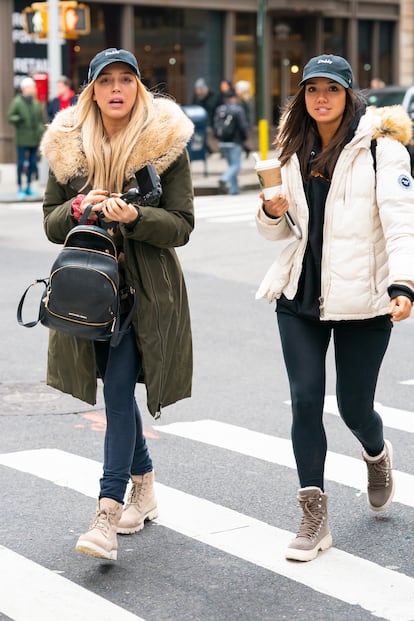How podcaster Alexandra Cooper built a million-dollar empire off discussing intimacies and ‘girl stuff’
The young American is the host of ‘Call Her Daddy’, one of the most listened to podcasts worldwide, where celebrities regularly appear to talk about their sex lives, and which Spotify acquired for an estimated $60 million in 2021

According to the latest data, in 2023 there are five million podcasts with more than 70 million episodes released. In 2022, amid such a vast ocean of content, one podcast called Call Her Daddy, hosted by Alexandra Cooper, rose to become the second most listened to in the world on Spotify, only behind The Joe Rogan Experience, presented by the American comedian of the same name. A little more than a year earlier, in 2021, the platform had inked a deal with Cooper for an estimated $60 million to exclusively broadcast Call Her Daddy for three years. This made the then 25-year-old a multi-millionaire and possibly one of the few cases where the myth of the so-called American dream actually seems to be fulfilled.
Rewind five years to 2018 and Alexandra Cooper (28, Pennsylvania) had just been laid off from her job. She had finished her studies in Media and Entertainment at Boston University a year previously and decided to give it a shot in New York City, where things didn’t go as she had anticipated: “I was living on unemployment benefits, I didn’t have a job. I was making videos and trying to make a niche for myself on YouTube,” she explained on her own program. She also earned extra cash through a dating site called Seeking Arrangement where men would pay her to go on a date. “The goal was I never wanted to do anything with these men, it was just to go get drinks and dinner, and by the end of the night have enough money for rent,” she added. Then she moved to the Lower East Side, where she shared an apartment with Sofia Franklyn (30, Utah), who would later become the other half of Call Her Daddy. An acquaintance suggested they record their adventures as young single women in Manhattan in podcast format and they decided to give it a go. In under two months, Call Her Daddy jumped from 12,000 listeners to two million. It did so by discussing dates that go well, dates that go wrong, sexting, foreplay, sex positions, tips on how to cope with a breakup, and even ways to discover if your partner is cheating on you. On the strength of their success, the production company Barstool Sports offered them a contract worth $75,000 a year for three years to keep recording the podcast and they duly signed the deal.
Call Her Daddy’s success can be attributed to several factors. The first is their strong friendship. Since its launch, both Cooper and Franklyn have exuded the chemistry like only two best friends can do. Their sense of humor has allowed them to bring some common ground to all the situations that any single twenty-something will most certainly face at some point in her life. All the more so if she steps into the quicksand of the explosive universe of express sex and liquid relationships. Both are often referred to by their fans as “big sisters,” a slightly heightened profile, with broader wisdom and experience than their female followers, who talk about “girl stuff.” The second factor is their way of navigating the ever-delicate line between aspiration and reality: Cooper and Franklyn could be invited to parties in the Hamptons, one of the most exclusive and coveted vacation areas in the United States. Yet, once there, the girls would say that they had been kicked out of a nightclub or that the date they had been on had gone dreadfully. However excessive their lifestyle might seem, they ultimately still provide content that their female followers can relate to. The third key to their success comes down to timing. In 2018, only a third of the podcasts that exist today were around. The conversational format was considered fresh and unique, and, in the post-MeToo era, Cooper and Franklin were able to cast themselves as fourth-wave feminists without yet coming in for criticism on whether their feminism was ultimately too white and too liberal.

“The podcast literally exploded,” Cooper said further down the line. “Our original contract stipulated that we could renegotiate our remuneration at the end of each year.” And so, they pushed for more. The program had become its own brand, not only attracting advertising contracts, but also selling its own merchandising. Alex and Sofia worked out what they wanted to earn for it and presented their wish list to their production company. However, Barstool Sports refused. It was 2020, and Cooper and Franklyn released one last double episode, called ‘Kesha’, and then they waited. By their own account, the production company offered them half a million dollars a year, but they declined. Cooper thought the figure was fair, but Franklyn believed they were being underpaid. They decided to wait a few days to mull over the decision and, in that time, in the midst of negotiations, Franklyn discovered that Cooper was earning more than she was for the program, which sparked a fall-out between the two friends.
Alexandra Cooper subsequently gave her own version of events. She claimed that she did more work than her colleague, since she was also responsible for editing the content and uploading it to social media, and therefore she was earning more money. Sofia Franklyn later took to social media to express her opinion about what happened: “I don’t really know how a friendship breakup feels, and part of the reason why is I realized later that this person was never my friend. I think I was completely just used as a vessel to get famous. She saw me, thought I was funny, she thought we had good chemistry. I confused that with a friendship and it really was just a business ploy on her end.” Understandably, fans were confused and upset by this split, casting doubt over the future of Call Her Daddy. Until Alexandra Cooper picked up the reins, took the podcast back off Barstool Sports, and returned to the show introducing herself as “a single daddy.”
Without Sofia, Alexandra decided to go for a Call Her Daddy where the second voice was always provided by her guests. The first star to appear on the show was Miley Cyrus, who went on the program in August 2020 and openly discussed her private life. The singer confessed to losing her virginity to her ex-husband, Liam Hemsworth, when she was 16 years old. She opened up about her bisexuality, confessing that she was attracted to women before men. And she shared how all the theories that appeared in the press about her love life left her feeling utterly frustrated by not allowing her to “control the narrative.” Since Cyrus appeared on the show, many celebrities have made guest appearances on the program (Jane Fonda, Hailey Bieber and Christina Aguilera) and all of them have spoken openly about their personal lives.
A year later, in the summer of 2021, Alexandra Cooper closed a deal with Spotify to co-produce her successful podcast with the platform. It was reported in the specialized media that the deal was for $20 million per year, over three years. “I’m incredibly grateful to all those who have supported, helped and formed part of Call Her Daddy,” she posted on social media after the agreement was reached. “Since its beginning three years ago, the program has always attempted to challenge the status quo and hold conversations that previously only occurred behind closed doors.” Cooper, now a millionaire, interweaves episodes where she interviews people of interest to the general public with others that are more up-close and personal, where only she speaks. ‘Why am I never horny?’ ‘How to overcome infidelity’ and ‘Your survival guide to dating apps’ are some of the latest programs released.
However, as the program has matured, so has its presenter. Of late, she has hosted entire programs devoted to mental health or entrepreneurship related issues. Speaking at a symposium on June 20 at the Cannes Festival of Creativity, Cooper explained that she still has a lot of issues to discuss, other than sex: “I talked about sex every week and, hey, I love sex, but there’s a lot more to me than being a cute girl who wants to hook up with guys. I was an athlete, I’ve been to college, I’ve studied film and communications. There are many, many more topics I want to discuss.” This will no doubt prove successful. Her fans, who call themselves #DaddyGang, follow her advice as if it were the millennial woman’s bible. It’s only natural that they refer to her as Daddy Cooper.
Sign up for our weekly newsletter to get more English-language news coverage from EL PAÍS USA Edition
Tu suscripción se está usando en otro dispositivo
¿Quieres añadir otro usuario a tu suscripción?
Si continúas leyendo en este dispositivo, no se podrá leer en el otro.
FlechaTu suscripción se está usando en otro dispositivo y solo puedes acceder a EL PAÍS desde un dispositivo a la vez.
Si quieres compartir tu cuenta, cambia tu suscripción a la modalidad Premium, así podrás añadir otro usuario. Cada uno accederá con su propia cuenta de email, lo que os permitirá personalizar vuestra experiencia en EL PAÍS.
¿Tienes una suscripción de empresa? Accede aquí para contratar más cuentas.
En el caso de no saber quién está usando tu cuenta, te recomendamos cambiar tu contraseña aquí.
Si decides continuar compartiendo tu cuenta, este mensaje se mostrará en tu dispositivo y en el de la otra persona que está usando tu cuenta de forma indefinida, afectando a tu experiencia de lectura. Puedes consultar aquí los términos y condiciones de la suscripción digital.









































